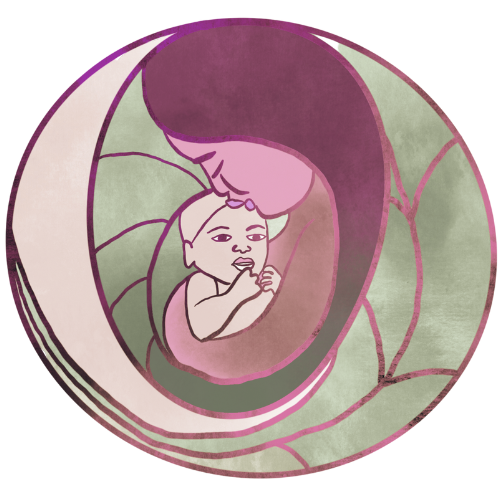Midwife vs. OB-GYN: Who’s the Right Guide for Your Birth Journey?
The Big Question—Midwife or OB-GYN?
You’re growing a human—what a wild and sacred thing. Your body knows exactly what to do, shifting and expanding, making space for this new life. But as you prepare to bring your baby earthside, one of the biggest choices you’ll make is who will walk this path with you.
In our modern world, birth has become so medicalized that many people don’t even realize they have options. But you do.
Both midwives and OB-GYNs bring expertise in delivering babies, but their approaches couldn’t be more different. If you believe birth is a natural, powerful experience—not just a medical event—you may find yourself drawn toward midwifery care.
But let’s take a deep breath and break it all down, so you can make the choice that feels most aligned with your body, your baby, and your vision for birth.
1. What’s the Difference? Midwife vs. OB-GYN
A midwife is a guardian of birth—a trained expert in physiological birth, holistic care, and whole-person support.
An OB-GYN is a medical doctor who specializes in obstetrics and gynecology, meaning they are trained in medical school to handle complications, surgery, and high-risk situations.
The key difference?
OB-GYNs are trained to manage birth, often relying on interventions like continuous monitoring, pain medication, and C-sections when they feel it’s necessary.
Midwives are trained to support birth, trusting the body’s innate wisdom and guiding you through labor with hands-on care, movement, and emotional support.
Not all midwives are the same. There are:
Certified Nurse Midwives (CNMs) – These midwives are trained nurses who can practice in hospitals, birth centers, or home settings.
Certified Professional Midwives (CPMs) – These midwives specialize in home births and natural birth care, providing a deeply personalized experience.
Midwives see birth as a sacred and natural process, not something to control. If you’re looking for care that trusts your body, honors your choices, and prioritizes connection over routine protocols, a midwife is likely the right fit.
2. What Type of Care Feels Right for You?
Close your eyes and imagine your prenatal care.
Do you want short, clinical visits that focus on tests and numbers? An OB-GYN might be for you.
Do you want long, unhurried conversations where you feel deeply seen, heard, and supported? A midwife might be the better choice.
Midwives treat pregnancy as a journey, not a condition. Their prenatal care includes nutrition, emotional support, and personalized guidance, while OB-GYN care tends to follow a medical model—focused on scans, screenings, and checking for complications.
Pain management is another big difference.
OB-GYNs provide hospital-based pain relief, including pain medication and epidurals.
Midwives focus on natural pain management like water birth, massage, acupressure, and movement-based coping techniques.
And if you’re considering home births, a midwife is the only choice—OB-GYNs only attend births in hospitals.
Your care should reflect your beliefs, your needs, and your comfort.
3. What If Your Pregnancy Is High-Risk?
Not every pregnancy is smooth sailing, and that’s okay. If you have high-risk pregnancies due to conditions like gestational diabetes or high blood pressure, an OB-GYN or maternal fetal medicine specialist may be needed for additional monitoring.
But that doesn’t mean you can’t work with a midwife, too. Many midwives collaborate with OB-GYNs, creating a hybrid model of care that allows for both medical oversight and holistic, hands-on support.
Midwives are highly trained in recognizing risk, and if your pregnancy shifts into a place where more medical care is needed, they’ll guide you with honesty and care. You will never be left alone.
4. Can You Have Both? Hybrid Care Explained
Some hospitals and birth centers offer collaborative care, where a midwife and an OB work together:
Your midwife provides the deeply personal, relationship-based care you want.
An OB-GYN is available for complications if needed.
And if you start with a midwife but need to transfer care? That’s okay, too. Birth is unpredictable, and good midwives always put your safety and well-being first.
Choosing What Feels Right in Your Bones
At the end of the day, the midwife vs. OB-GYN decision isn’t about statistics or hospital policies. It’s about you.
Birth is primal. Birth is instinctive. Birth is your body doing what it was made to do.
If you want a provider who will listen deeply, trust birth, and support you through every wave of labor with skill and heart, a midwife is the way to go.
If you’re still unsure, reach out to Nets. She’s guided so many families through this choice with wisdom, experience, and an open heart.
Birth is yours. Make the choice that feels right in your bones. 🌿✨
